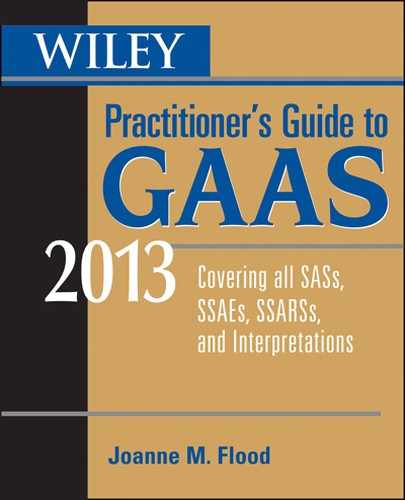PCAOB 1: References in Auditors’ Reports to the Standards of the Public Company Accounting Oversight Board
EFFECTIVE DATE AND APPLICABILITY
| Effective Date | This standard currently is effective. |
| Applicability | Auditors’ reports on audits and other engagements relating to public companies and other issuers. |
DEFINITIONS OF TERMS
Auditor. As used in the standard, the term refers to both public accounting firms registered with the Public Company Accounting Oversight Board (PCAOB) and associated persons.
FUNDAMENTAL REQUIREMENTS
When an engagement is performed in accordance with the standards of the PCAOB, and the auditor is required by the interim standards to refer in a report to generally accepted auditing standards, US generally accepted auditing standards (GAAP), auditing standards generally accepted in the United States of America, or standards established by the American Institute of Certified Public Accountants (AICPA), the auditor must instead refer to “the standards of the Public Company Accounting Oversight Board (United States).”
Auditors must also include the city and state from which the report is issued. (Non-US auditors are required to include the city and country.)
OTHER PCAOB GUIDANCE
In addition to the PCAOB standards and interpretations discussed in this volume, practitioners should be aware of the following guidance available on the PCAOB website.
Staff Audit Practice Alerts
Staff Audit Practice Alerts highlight new, emerging, or otherwise noteworthy circumstances that may affect how auditors conduct audits under the existing requirements of PCAOB standards and relevant laws. The statements contained in Staff Audit Practice Alerts are not rules of the Board and do not reflect any Board determination or judgment about the conduct of any particular firm, auditor, or any other person:
- Alert No. 9: Assessing and Responding to Risk in the Current Economic Environment (Dec. 6, 2011)
- Alert No. 8: Audit Risks in Certain Emerging Markets (Oct. 3, 2011)
- Alert No. 7: Auditor Considerations of Litigation and Other Contingencies Arising from Mortgage and Other Loan Activities (Dec. 20, 2010)
- Alert No. 6: Auditor Considerations Regarding Using the Work of Other Auditors and Engaging Assistants from Outside the Firm (July 12, 2010)
- Alert No. 5: Auditor Considerations Regarding Significant Unusual Transactions (April 7, 2010)
- Alert No. 4: Auditor Considerations Regarding Fair Value Measurements, Disclosures, and Other-Than-Temporary Impairments (April 21, 2009)
- Alert No. 3: Audit Considerations in the Current Economic Environment (Dec. 5, 2008)
- Alert No. 2: Matters Related to Auditing Fair Value Measurements of Financial Instruments and the Use of Specialists (Dec. 10, 2007)
- Alert No. 1: Matters Related to Timing and Accounting for Option Grants (July 28, 2006)
Staff Questions and Answers
Staff questions and answers set forth the staff’s opinions on issues related to the implementation of the standards of the PCAOB. The PCAOB publishes questions and answers to help auditors implement, and the Board’s staff administer, the Board’s standards. The statements contained in the staff questions and answers are not rules of the Board, nor have they been approved by the Board.
- Auditing Standard No. 7, Engagement Quality Review (Feb. 19, 2010)
- References to Authoritative Accounting Guidance in PCAOB Standards (Sept. 2, 2009)
- Ethics and Independence Rules Concerning Independence, Tax Services, and Contingent Fees (April 3, 2007)
- Auditing the Fair Value of Share Options Granted to Employees (Oct.17, 2006)
- Adjustments to Prior-Period Financial Statements Audited by a Predecessor Auditor (June 9, 2006)
- Attest Engagements Regarding XBRL Financial Information Furnished under the XBRL Voluntary Financial Reporting Program on the EDGAR System (May 25, 2005)
- Audits of Financial Statements of Non-Issuers Performed Pursuant to the Standards of the Public Company Accounting Oversight Board (June 30, 2004)
Other Staff Guidance
Staff guidance sets forth the staff’s views on issues related to the implementation of the standards of the PCAOB. The statements contained in staff guidance are not rules of the Board, nor have they been approved by the Board.
- Staff Views—An Audit of Internal Control Over Financial Reporting That Is Integrated with An Audit of Financial Statements: Guidance for Auditors of Smaller Public Companies (Jan. 23, 2009)
- Preliminary Staff Views—An Audit of Internal Control That Is Integrated with An Audit of Financial Statements: Guidance for Auditors of Smaller Public Companies (Oct. 17, 2007)
- Preliminary Staff Views—Comment letters
INTERPRETATION: COMMISSION GUIDANCE REGARDING THE PUBLIC COMPANY ACCOUNTING OVERSIGHT BOARD’S AUDITING AND RELATED PROFESSIONAL PRACTICE STANDARD NO. 1
The Securities and Exchange Commission (SEC) issued this interpretation to assist with the implementation of PCAOB 1. The interpretation states that references in SEC rules and staff guidance and in federal securities laws to generally accepted auditing standards (GAAS) or to specific standards under GAAS that relate to issuers are now understood to mean the PCAOB’s standards and any applicable rules of the SEC.
The interpretation also states that when a report previously filed with the SEC is incorporated by reference, the report incorporated by reference would not need to include the reference to the PCAOB’s standards.
The full text of the release can be found at www.sec.gov/rules/interp/33-8422.htm.
